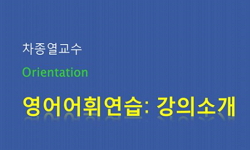The study aims to explore Korean L2 learners’ gap between receptive and productive vocabulary knowledge and the factors affecting it. Taking an individual word-based approach, this research initially screened the participants out so that only the le...
http://chineseinput.net/에서 pinyin(병음)방식으로 중국어를 변환할 수 있습니다.
변환된 중국어를 복사하여 사용하시면 됩니다.
- 中文 을 입력하시려면 zhongwen을 입력하시고 space를누르시면됩니다.
- 北京 을 입력하시려면 beijing을 입력하시고 space를 누르시면 됩니다.

Korean L2 Learners’ Vocabulary Gap between Receptive and Productive Knowledge and the Factors Affecting the Gap
한글로보기https://www.riss.kr/link?id=A103504784
- 저자
- 발행기관
- 학술지명
- 권호사항
-
발행연도
2017
-
작성언어
English
- 주제어
-
등재정보
KCI등재
-
자료형태
학술저널
- 발행기관 URL
-
수록면
281-304(24쪽)
- 제공처
- 소장기관
-
0
상세조회 -
0
다운로드
부가정보
다국어 초록 (Multilingual Abstract)
The study aims to explore Korean L2 learners’ gap between receptive and productive vocabulary knowledge and the factors affecting it. Taking an individual word-based approach, this research initially screened the participants out so that only the learners who perceived to ‘know’ all the target words were tested. A total of 90 out of 101 university students were tested with 96 questions (adopted from Nation 2001 and created based on Nation 2012). The results of an independent t-test suggest the imbalance of their vocabulary knowledge with smaller productive than receptive knowledge. The results of comparison between the words with production-based learning treatment and the ones without confirm the effectiveness of the production-based learning in order to narrow the receptive-productive gap. The results of Pearson product-moment correlation coefficient suggest that the learners with more experience in L2 production had narrower gap between receptive and productive knowledge.
목차 (Table of Contents)
- I. Introduction
- II. Literature Review
- III. Method
- IV. Results
- V. Discussion
- I. Introduction
- II. Literature Review
- III. Method
- IV. Results
- V. Discussion
- VI. Conclusion and Pedagogical Implications
- Works Cited
동일학술지(권/호) 다른 논문
-
- 신영어영문학회
- 김명진(Kim, Myeong Jin)
- 2017
- KCI등재
-
- 신영어영문학회
- 김영덕(Kim, Yungduk)
- 2017
- KCI등재
-
- 신영어영문학회
- 김우형(Kim, Woo Hyung)
- 2017
- KCI등재
-
영어 경동사구에 뒤따르는 동명사-분사 사용의 확산: 코퍼스 연구
- 신영어영문학회
- 김혜리(Kim, Hyeree)
- 2017
- KCI등재





 DBpia
DBpia







